
Archive
| Book Alert, September - October 2015 |
| 01. Hostile intent and counter-terrorism: human
factors theory and application/ Stedmon, Alex, Ed - England: Ashgate, 2015 |
 |
Abstract: This volume brings together research from around the world to
explore a range of topics within the project of detecting terrorist activities. It is divided into six key themes:
conceptualising terrorism, deception and decision making, social and cultural factors in terrorism, modelling hostile
intent, strategies for counter-terrorism, and future directions. Twenty four chapters explore the spectrum of detecting
terrorist activities, hostile intent, crowded public spaces and suspicious behaviour. A variety of disciplines are
represented, including ergonomics/human factors, psychology, criminology, cognitive science, sociology, political theory,
engineering and computer science. |
| 02. How Modi won it: notes from the 2014 election / Khare,
Harish - Gurgoan: Hachette , 2014 |
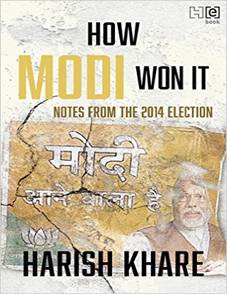 |
Abstract: Marked by deep ideological divisions, a massive advertising blitz
and an election campaign that could claim to rival the US presidential polls, the 2014 general election has been called
'historic' for its verdict, which marked the first time in three decades a political party received a majority in
the Lok Sabha. In this personal, partisan and superbly perceptive narrative of how the dice rolled through the last 4
months leading up to 16 May 2014, Harish Khare - journalist, columnist, scholar and former media advisor to Prime
Minister Manmohan Singh - provides an honest, impassioned record of India's greatest democratic exercise. Through a
meticulous account of what he saw, heard and read, Khare elucidates how the different political stakeholders kneaded into
their day-to-day campaign rhetoric the latent cultural angst, economic anxieties and political expectations of a nation
that has changed irrevocably over the past decade to persuade the Indian voter. From the brilliant and flexible campaign
pitch made by the BJP to the jaded and outdated Congress rhetoric, from openly expressed middle-class aspirations to
rural India's hopes, and from communal polarization to shifting caste equations, How Modi Won It provides brilliant
insight and an incisive assessment of one of the most memorable elections in recent history. |
| 03. In and out of Suriname: language, mobility and identity/
Carlin, Eithne B., Ed - Boston: Brill, 2015 |
 |
Abstract: This title will be available online in its entirety in Open Access
In and Out of Suriname: Language, Mobility and Identity offers a fresh multidisciplinary approach to multilingual
Surinamese society, that breaks through the notion of bounded ethnicity enshrined in historical and ethnographic
literature on Suriname. |
| 04. Incitement in international law / Timmermann, Wibke K -
London: Routledge , 2015 |
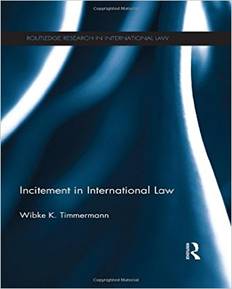 |
Abstract: This book offers a comprehensive study of incitement in its
various forms in international law. It discusses the status of incitement to hatred in human rights law and examines its
harms and dangers as well as the impact of a prohibition on freedom of speech. The book additionally presents a detailed
definition of punishable incitement. In this context, Wibke K. Timmermann argues that incitement should be recognized as
the crime of persecution, where it is utilized within a system of persecutory measures by the State or a similarly
powerful organization. The book draws on the Nahimana case before the International Criminal Tribunal for Rwanda, as well
as jurisprudence from German and other courts following World War II to provide support for this proposal. The work
moreover provides a comprehensive analysis of public incitement to crimes; solicitation or instigation; and the related
modes of liability aiding and abetting and commission through another person. |
| 05. India and South Asia: exploring regional perceptions/
Chandra, Vishal, Ed - New Delhi: Pentagon Press , 2015 |
 |
Abstract: Perceptions play a very significant role in South Asian politics.
They have largely shaped and influenced state policies and politics among the South Asian countries, especially in
relation to India, over the years. State policies have at times been hostage to negative or adversarial perceptions,
well-entrenched in the popular psyche. The perception formation in South Asia is an extremely dynamic process and has
evolved differently in different countries. Perceptions are not static and often change with the shift in domestic as
well as regional and global politics. There are myriad stakeholders—with diverse sectional interests - explicitly
or implicitly shaping and influencing perceptions among countries in South Asia. |
| 06. India and the nuclear non-proliferation regime: the perennial
outliner/ Kumar, A. Vinod - New Delhi: Cambridge University Press , 2015 |
 |
Abstract: The book is a comprehensive study of India's relationship with
the non-proliferation regime, and its transformative evolution from a perennial outlier to one seeking greater
integration with the regime and its normative structures. The highlight of this study is its incisive conceptual analysis
of the regime as a functional system and its structural complexities, which brings forth new insights on the regime's
core ideas like non-proliferation and counter-proliferation. The book also provides an extensive non-Western narrative on
the concept of counter-proliferation and its conceivable role and influence in the regime. It breaks new ground in
explaining India's quest for an anti-proliferation strategy, which could determine its status and future in the
emerging global nuclear order. It will be a substantial contribution to the literature on India's approach towards
non-proliferation, counter-proliferation and disarmament, and will enhance the understanding of the impact of the
regime's normative structures on India's nuclear decisions. |
| 07. India-EU People mobility: historical, economic and
regulatory dimensions/ Chanda, Rupa, Ed - Delhi: Cambridge University Press , 2015 |
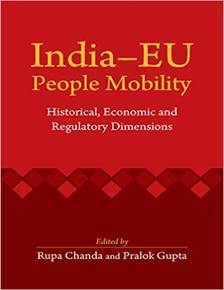 |
Abstract: “The mobility of people lies at the heart of economic
advance, and creates large gains not only to the migrants themselves but also too many in the countries of origin and
destination. India and the EU are natural partners and this book offered a rich multi-dimensional analysis of the history
and structure of the flow between them; it contains several highly informative sectoral studies and recommendations for
policy. It is an important piece of scholarship and a ’must read’ for anyone interested in mobility in
general or in India-EU relations.” |
| 08. Indonesia’s ascent: power, leadership, and the regional
order/ Roberts, Christopher B, Ed - New York: Palgrave Macmillan, 2015 |
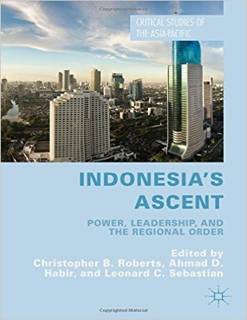 |
Abstract: As Indonesia's economy grows, it is increasingly being
referred to as a rising middle power and there is mounting speculation that Indonesia might eventually join the ranks of
Asia's great powers. Regardless of just how far Indonesia will rise, its government and the will of its people will
become increasingly influential in terms of its regional leadership and the values and the norms Jakarta espouses. What
are the domestic opportunities and constraints that inform Indonesia's rise and how will various domestic contexts
affect Indonesia's foreign policy and the values it espouses? This volume provides a timely analysis of the key
domestic and transnational opportunities and challenges associated with Indonesia's ascent. The contributors explore
a range of issues including Indonesia's economic resources, political institutions, identity and independence, as
well as Jakarta's regional relations, leadership and the exercise of hard and soft power. The book examines the
likely directions for Indonesian foreign policy following the election of President Joko Widodo in 2014 and this
collection also offers an assessment of the potential trajectory of Indonesia's future. |
| 09. International Environmental Law: a modern introduction/ Dupuy,
Pierre-Marie - New York: Cambridge University Press, 2015 |
 |
Abstract: This textbook provides a concise, conceptually clear, and legally
rigorous introduction to contemporary international environmental law and practice. Written in an accessible style, the
book covers all the major multilateral environmental agreements, paying particular attention to their underlying
structure, their main legal provisions, and their practical operation. The material is structured into four sections: (I)
Foundations, (II) Substantive regulation, (III) Implementation, and (IV) International environmental law as a
perspective. The presentation of the material blends policy and legal analysis and makes extensive reference to the
relevant treaties, instruments and jurisprudence. All chapters include a detailed bibliography along with numerous
figures to summarise the main components of the regulation. It covers emerging topics such as foreign investment and the
environment, environmental migration, climate change and human rights, technology diffusion, and environmental security
in post-conflict settings. |
| 10. The international law of the sea / Tanaka, Yoshifumi - New
York: Cambridge University Press, 2015 |
 |
Abstract: The law of the sea is a complex and fascinating subject. This
textbook explores the subject from the perspective of public international law, covering all the key topics from the
legal regimes governing the different jurisdictional zones, to international co-operation for protection of the marine
environment. Students interested in international environmental and natural resources law will find chapters on emerging
issues such as the conservation and the protection of natural resources and biodiversity in the oceans. It includes
student-friendly features such as chapter overviews, conclusions, figures and tables and further reading sections.
Clarity of expression, engaging analysis and comprehensive coverage make this book essential reading for all students of
the law of the sea. |
| 11. International relations of the middle east / Valbjorn,
Morten, Ed - London: Sage Library of International Relations, 2015 |
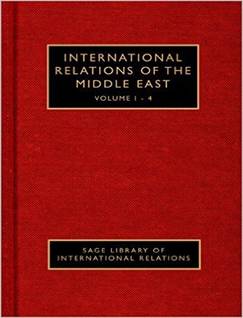 |
Abstract: Now in its second edition, this popular textbook presents a
comprehensive and balanced analysis of the international politics of the Middle East. Part I gives an historical
framework, Part II looks at major themes in international relations and applies them to the area, and Part III examines
region-specific conflicts and issues. The book has been fully revised and updated, with two new chapters on the nature of
Islam and the war in Iraq. International Relations of the Middle East is accompanied by an Online Resource Centre, which
includes: For Students: News feeds Interactive time line Web links Chapter exercises. |
| 12. Intimate rivals: Japanese domestic politics and a rising China
/ Smith, Sheila A. - New York: Columbia University Press, 2015 |
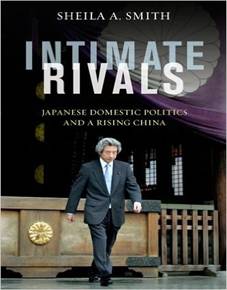 |
Abstract: No country feels China's rise more deeply than Japan. Through
intricate case studies of visits by Japanese politicians to the Yasukuni Shrine, conflicts over the boundaries of
economic zones in the East China Sea, concerns about food safety, and strategies of island defense, Sheila A. Smith
explores the policy issues testing the Japanese government as it tries to navigate its relationship with an advancing
China. Smith finds that Japan's interactions with China extend far beyond the negotiations between diplomats and
include a broad array of social actors intent on influencing the Sino-Japanese relationship. Some of the tensions
complicating Japan's encounters with China, such as those surrounding the Yasukuni Shrine or territorial disputes,
have deep roots in the postwar era, and political advocates seeking a stronger Japanese state organize themselves around
these causes. Other tensions manifest themselves during the institutional and regulatory reform of maritime boundary and
food safety issues. |
| 13. Irregular migration and human security in East Asia /
Song, Jiyoung, Ed - London: Routledge, 2015 |
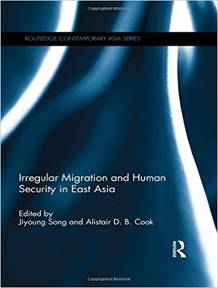 |
Abstract: Across East Asia, intra-regional migration is more prevalent than
inter-regional movements, and the region’s diverse histories, geopolitics, economic development, ethnic
communities, and natural environments make it an excellent case study for examining the relationship between irregular
migration and human security. Irregular migration can be broadly defined as people’s mobility that is unauthorised
or forced, and this book expands on the existing migration-security nexus by moving away from the traditional state
security lens, and instead, shifting the focus to human security. With in-depth empirical country case studies from the
region, including China, Japan, North Korea, the Philippines, Burma/Myanmar, Cambodia, Thailand and Singapore, the
contributors to this book develop a human security approach to the study of irregular migration. In cases of irregular
migration, such as undocumented labour migrants, asylum seekers, internally displaced people, trafficked persons, and
smuggled people, human security is the cause and/or effect of migration in both sending and receiving countries. |
| 14. ISIS exposed: beheadings, slavery, and the hellish reality of
radical Islam/ Stakelbeck, Erick - New Jersey: Regnery Publishing, 2015 |
 |
Abstract: The terror masters of ISIS are determined to get America's
attention. They’ve humiliated the Iraqi Army we trained and seized territory in Iraq that we had secured at the
cost of so many American lives. They’ve beheaded American journalists on camera in a direct challenge to the power
and resolve of the United States. And now ISIS is calling for "city wolves" across the United States to act on
their dedication to the Islamic State’s blood-drenched ideology and murder innocent American citizens at random.
Who is ISIS? Where did it come from, and what is driving its successful campaign of murder and conquest? Our government
and our media alike seemed to be blindsided by the Islamic State’s blitzkrieg-like advance, which forced American
troops back into Iraq. ISIS has conquered a territory roughly the size of the state of Indiana, rules over eight million
terrorized souls, and has even revived the practice of legal slavery. |
| 15. Israelis and Palestinians in the shadows of the wall:
space of separation and occupation / Abdallah, Stephanie Latte, Ed - England: Ashgate, 2015 |
 |
Abstract: Shedding light on the recent mutations of the Israeli separation
policy, whose institutional and spatial configurations are increasingly complex, this book argues that this policy has
actually reinforced the interconnectedness of Israelis and Palestinian lives and their spaces. Instead of focusing on the
over-mediatized separation wall, this book deals with what it hides: its shadows. Based on fieldwork studies carried out
by French, Italian, Israeli, Palestinian and Swiss researchers on the many sides of the Israeli-Palestinian divide, it
highlights a new geography of occupation, specific forms of interconnectedness and power relations between Israeli and
Palestinian spaces. It offers a better understanding of the transformation of people’s interactions, their
experiences and the ongoing economy of exchanges created by the separation regime. This heterogeneous regime increasingly
involves the participation of Palestinian and international actors. Grounded in refined decryptions of territorial
realities and of experiences of social actors’ daily lives this book goes beyond usual political, media and
security representations and discourses on conflict to understand its contemporary stakes on the ground. |
| 16. Japanese diplomacy: the role of leadership/ Envall, H.D.P
- New York: Suny Press , 2015 |
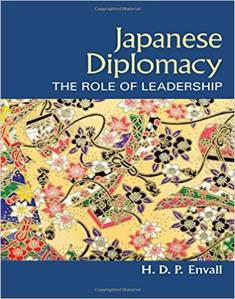 |
Abstract: A political leader is most often a nation’s most high-
profile foreign policy figure, its chief diplomat. But how do individual leadership styles, personalities, perceptions,
or beliefs shape diplomacy? In Japanese Diplomacy, the question of what role leadership plays in diplomacy is applied to
Japan, a country where the individual is often viewed as being at the mercy of the group and where prime ministers have
been largely thought of as reactive and weak. In challenging earlier, simplified ideas of Japanese political leadership,
H. D. P. Envall argues that Japan’s leaders, from early Cold War figures such as Yoshida Shigeru to the charismatic
and innovative Koizumi Jun’ichirō to the present leadership of Abe Shinzō, have pursued leadership strategies of
varying coherence and rationality, often independent of their political environment. |
| 17. Making and unmaking nations: war, leadership, and
genocide in modern Africa/ Straus, Scott- London: Cornell University Press, 2015 |
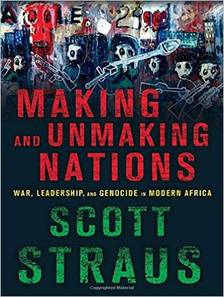 |
Abstract: In Making and Unmaking Nations, Scott Straus seeks to explain why
and how genocide takes place-and, perhaps more important, how it has been avoided in places where it may have seemed
likely or even inevitable. To solve that puzzle, he examines postcolonial Africa, analyzing countries in which genocide
occurred and where it could have but did not. Why have there not been other Rwanda’s ? Straus finds that deep-
rooted ideologies-how leaders make their nations-shape strategies of violence and are central to what leads to or away
from genocide. Other critical factors include the dynamics of war, the role of restraint, and the interaction between
national and local actors in the staging of campaigns of large-scale violence. Grounded in Straus's extensive
fieldwork in contemporary Africa, the study of major twentieth-century cases of genocide, and the literature on genocide
and political violence, Making and Unmaking Nations centers on cogent analyses of three non genocide cases (Côte
d’Ivoire, Mali, and Senegal) and two in which genocide took place (Rwanda and Sudan). |
| 18. Making diplomacy work: intelligent innovation for the
modern world/ Hare, Paul Webster - London: Sage , 2016 |
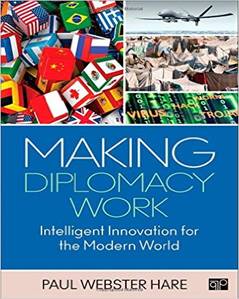 |
Abstract: Living Diplomacy promises to take a fresh look at the actual
practice of diplomacy, setting diplomacy in its contemporary context and analyzing the major factors that have changed
the nature of the intelligent conduct of diplomacy. Unlike other books on the market which are written by academics,
Living Diplomacy is written from the vantage point of someone who not only knows and teaches about the scholarly
underpinnings of diplomacy, but who has lived that experience himself. Ambassador Hare provides a thorough, critical
survey of how diplomacy has evolved, the way its institutions have been created, and, crucially, new challenges to its
operations. It examines not just the fundamentals -- state to state relations, negotiation, and key diplomatic
institutions -- but also considers the role of non-state actors, the impact of modern communications technologies, the
effect of transnational issues, and globalized international business practices. Bringing diplomacy to life for students,
every chapter of the book is full of many real world examples from contemporary diplomacy, including events from the
author's own experience. Chapters also feature extended case studies, covering topics like diplomatic immunity and
privileges, the achievements and failures of institutions like the UN, successes and failures in diplomatic negotiations,
the effectiveness of international law and its impact on diplomacy, and more. |
| 19. The making of Indian Diplomacy: a critique of
eurocentrism/ Datta-Ray, Deep K - London: Hurst & Company, 2015 |
 |
Abstract: Founded on unique research within India's Ministry of External
Affairs, this book overturns much of the accepted wisdom about Indian diplomacy being simply a derivative of European
colonial models, in the process shedding new light on the nature of the Indian state. Datta-Ray argues on the basis of
observed practices, and informal interactions and interviews with ministers and diplomats, that the core of Indian
diplomatic practice is to be found in the national epic, the Mahabharata, whose influence he traces from pre-Mughal times
to the present. Moreover, the durability of the Mahabharata's influence on Indian diplomacy was secured by
India's most significant relationship of the modern political era, that between Mohandas Gandhi and Jawaharlal Nehru.
The epic inspired Gandhi's innovative conception of terminating violence non-violently, or satyagraha. |
| 20. Making war, making peace: conflict resolution in South
Asia/ Manchanda, Rita - London : Sage , 2015 |
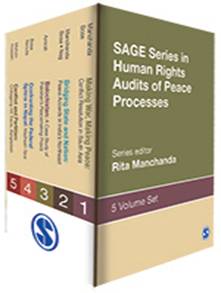 |
Abstract: The SAGE Series in Human Rights Audits of Peace Processes provides
an overview of peace-audit study and explores why many peace processes fail. It provides comparative analyses of peace
processes in South Asia drawn from field-based audit exercises in four regions: Northeast India; Balochistan, Pakistan;
Madhesh, Nepal and Chittagong Hills Tracts, Bangladesh. |
| 21. Maritime power building: new 'Mantra' for
China's rise/ Agnihotri, Kamlesh K, Ed - New Delhi: Pentagon Press, 2015 |
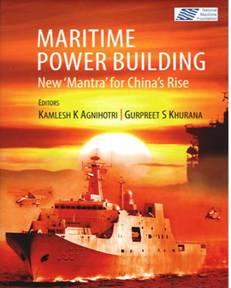 |
Abstract: The growth of China’s maritime prowess has been a key facet
marking the ascendency of its comprehensive national power. A fact amply indicated both by the articulation of the
Chinese leadership and empirical evidences, it flows from Beijing`s realisation of the growing salience of the oceanic
realm and the attendant imperative of being strong at sea for China to attain the status of a global power. In recent
years, the scale and speed with which, the erstwhile continental power has accreted all facets of its maritime capacity-
both civilian and military - has surpassed the best practitioners of the `maritime trade-craft`, worldwide. In this book
titled `Maritime Power Building: New `Mantra for China`s Rise’, ‘Mantra’ is an Indian word denoting a
sacred utterance, believed to have spiritual power. |
| 22. The Modi effect: inside Narendra Modi's campaign to
transform India/ Price, Lance - UK: Hodder & Stoughton, 2015 |
 |
Abstract: Political parties in Britain, Australia and North America pride
themselves on the sophistication of their election strategies, but Modi's campaign was a master-class in modern
electioneering. His team created an election machine that broke new ground in the use of social media, the Internet,
mobile phones and digital technologies. Modi took part in thousands of public events, but in such a vast country it was
impossible to visit every town and village. The solution? A 'virtual Modi' - a life-size 3D hologram - beamed to
parts he could not reach in person. These pioneering techniques brought millions of young people to the ballot box - the
holy grail of election strategists everywhere - as Modi trounced the governing Congress Party led by the Gandhi dynasty.
Former BBC correspondent and Downing Street communications expert Lance Price has been granted exclusive access to Prime
Minister Narendra Modi and his team of advisers. With complete freedom to tell it as he finds it, he details Modi's
rise to power, the extraordinary election victory and its aftermath. The Modi Effect: Inside Narendra Modi's campaign
to transform India lifts the lid on a whole new box of tricks, where message-management and IT wizardry combined to
create a vote-winning colossus of awesome potency. |
| 23. The mystery of contemporary Iran / Shirali, Mahnaz -
London: Transaction Publishers, 2015 |
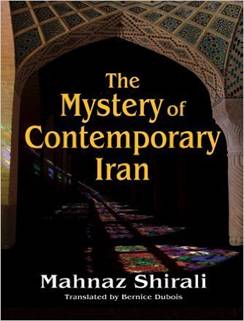 |
Abstract: The mystery of how an Islamic dictatorship came to power remains
more than thirty years after the Islamic Republic’s inception in Iran. The precise nature of a regime that calls
itself both a republic and Islamic but is neither is little understood. The ayatollahs’ unpopularity may have
reached unprecedented heights, but their power seems more secure. Such paradoxes weigh heavily and judgments diverge.
While public opinion wonders how an archaic theocratic regime could survive so long, some explain it in terms of
Iran’s continued modernization and the clergy’s ability to reconcile itself with politics. Understanding the
modernization process propelled by the Constitutional Revolution is difficult and raises questions. How and why could
ideological Islam continue to dominate Iranian society since the late 1970s? How did it gain power and influence and
overcome the reforms molded by the Constitutional Revolution? Mahnaz Shirali analyzes twentieth-century Iranian history
to understand the Shiite clergy’s role in a modernized country’s social and political organization. She
explains what enabled the clergy to take over prevailing political forces and gain control of the state. |
| 24. Narcissism and politics: dreams of glory/ Post, Jerrold
M. - New York: Cambridge university Press, 2015 |
 |
Abstract: In this age of narcissism, the proliferation of politicians with
significant narcissistic personality features is dramatic. Driven by dreams of glory, they seem to find the spotlight
that the arena of politics provides irresistible. This book analyzes narcissism and politics and systematically explores
the psychology of narcissism - the entitlement, the grandiosity and arrogance overlying insecurity, the sensitivity to
criticism, and the hunger for acclaim - illustrating different narcissistic personality features through a spectrum of
international and national politicians. It addresses the power of charismatic leader-follower relationships, as well as
the impact of age and illness on leaders driven by dreams of glory. |
| 25. National climate policy: a multi-field approach/ Boasson,
Elin Lerum - London: Routledge, 2015 |
 |
Abstract: Failed attempts at producing ambitious global climate commitments
and instruments have made it increasingly important for nation states to deliver climate policies. This in turn requires
a better understanding of national climate policymaking. In this book, Elin Lerum Boasson develops an innovative
and well-grounded analytical framework for assessing national climate-policy development. Why do national climate
policies emerge and change? This question is underpinned by the role played by different actors and the kind social
mechanism at work. Boasson asks, to what extent and how is the emergence and change of climate policy influenced by:
politicians and the national political fields; business and organizational fields; EU policy and the European
environment; social and entrepreneurial mechanisms? |
| 26. Negotiating water governance / Norman, Emma S., Ed -
England: Ashgate, 2015 |
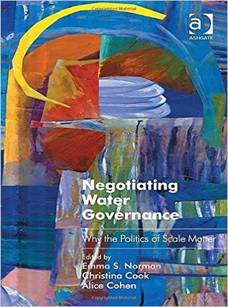 |
Abstract: Those who control water, hold power. Complicating matters, water
is a flow resource; constantly changing states between liquid, solid, and gas, being incorporated into living and non-
living things and crossing boundaries of all kinds. As a result, water governance has much to do with the question of
boundaries and scale: who is in and who is out of decision-making structures? Which of the many boundaries that water
crosses should be used for decision-making related to its governance? Recently, efforts to understand the relationship
between water and political boundaries have come to the fore of water governance debates: how and why does water
governance fragment across sectors and governmental departments? How can we govern shared waters more effectively? How do
politics and power play out in water governance? This book brings together and connects the work of scholars to engage
with such questions. The introduction of scalar debates into water governance discussions is a significant advancement of
both governance studies and scalar theory: decision-making with respect to water is often, implicitly, a decision about
scale and its related politics. |
| 27. Networks in contention: The divisive politics of climate
change/ Hadden, Jennifer - New York: Cambridge university Press, 2015 |
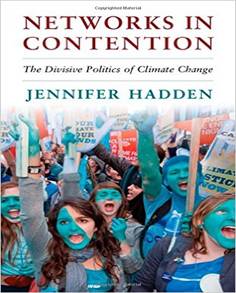 |
Abstract: How do civil society organizations mobilize on climate change? Why
do they choose certain strategies over others? What are the consequences of these choices? Networks in Contention
examines how the interactions between different organizations within the international climate change movement shape
strategic decisions and the kinds of outcomes organizations are able to achieve. First, it documents how and why
cleavages emerged in this once-unified movement around the time of the 2009 Copenhagen Summit. Second, it shows how an
organization's position in the movement's network has a large influence on the tactics it adopts. Finally, it
demonstrates how the development of new strategies within this network has influenced the trajectory of global climate
politics. The book establishes the ways in which networks are consequential for civil society groups, exploring how these
actors can become more effective and suggesting lessons for the future coordination of activism. |
| 28. The new nuclear disorder: challenges to deterrence and
strategy/ Cimbala, Stephen J. - Engalnd: Ashgate, 2015 |
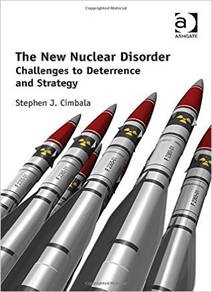 |
Abstract: In the twenty-first century, the United States confronts an
international system of great complexity and shifting security challenges. Among these challenges are those posed by
nuclear weapons. Instead of becoming obsolete or being marginalized by the end of the Cold War and the demise of the
Soviet Union, nuclear weapons have become more important to present and future international stability and peace but the
relationship is paradoxical. On one hand, the spread of nuclear weapons to additional states with unsettled grievances or
hegemonic ambitions threatens to destabilize local balances of power and set off regional arms races. In addition, the
possible acquisition by terrorists of nuclear weapons or fissile materials creates a threat that may be ‘beyond
deterrence’ according to hitherto accepted concepts. On the other hand, nuclear weapons in the hands of other
states can contribute to stable deterrence and help to prevent nuclear proliferation to international miscreants. Certain
cases loom large in the short run that highlight this book’s relevance, including the possible acquisition and
deployment of nuclear weapons by Iran and the continuing tensions created by North Korea’s nuclear arsenal. The
Obama ‘pivot’ of national security and defense emphasis to Asia reflects not only the growing economic
importance of that region, but also the growing number of security dilemmas in a region that is already awash in nuclear
forces. The management of nuclear crises and even the possible need to terminate nuclear wars before they expand beyond a
single region are among the possible challenges facing future U.S. and allied policy makers and military leaders. |
| 29. Nigeria / Falola, Toyin - England : ABC-CLIO ,
2015 |
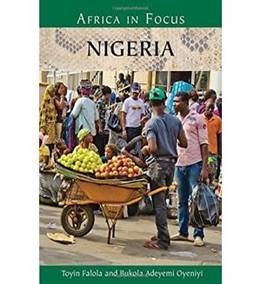 |
Abstract: Nigeria is Africa's most populous country and the world's
eighth largest oil producer, but its success has been undermined in recent decades by ethnic and religious conflict,
political instability, rampant official corruption and an ailing economy. Toyin Falola, a leading historian intimately
acquainted with the region, and Matthew Heaton, who has worked extensively on African science and culture, combine their
expertise to explain the context to Nigeria's recent troubles through an exploration of its pre-colonial and colonial
past, and its journey from independence to statehood. By examining key themes such as colonialism, religion, slavery,
nationalism and the economy, the authors show how Nigeria's history has been swayed by the vicissitudes of the world
around it, and how Nigerians have adapted to meet these challenges. This book offers a unique portrayal of a resilient
people living in a country with immense, but unrealized, potential. |
| 30. Oil, illiberalism, and war: an analysis of energy and US
foreign policy/ Price-Smith, Andrew T. - London: The MIT Press, 2015 |
 |
Abstract: The United States is addicted to crude oil. In this book, Andrew
Price-Smith argues that this addiction has distorted the conduct of American foreign policy in profound and malign ways,
resulting in interventionism, exploitation, and other illiberal behaviors that hide behind a facade of liberal
internationalism. The symbiotic relationship between the state and the oil industry has produced deviations from rational
foreign energy policy, including interventions in Iraq and elsewhere that have been (at the very least) counterproductive
or (at worst) completely antithetical to national interests. Liberal internationalism casts the United States as a benign
hegemon, guaranteeing security to its allies during the Cold War and helping to establish collaborative international
institutions. Price-Smith argues for a reformulation of liberal internationalism (which he terms shadow liberalism) that
takes into account the dark side of American foreign policy. Price-Smith contends that the "free market" in
international oil is largely a myth, rendered problematic by energy statism and the rise of national oil companies. He
illustrates the destabilizing effect of oil in the Persian Gulf, and describes the United States' grand energy
strategy, particularly in the Persian Gulf, as illiberal at its core, focused on the projection of power and on periodic
bouts of violence. Washington's perennial oscillation between liberal phases of institution building and provision of
public goods and illiberal bellicosity, Price-Smith argues, represents the shadow liberalism that is at the core of US
foreign policy. |
| 31. Origins and evolution of the US rebalance toward Asia:
diplomatic, military, and economic dimensions/ Meijer, Hugo, Ed - New York: Palgrave Macmillan, 2015 |
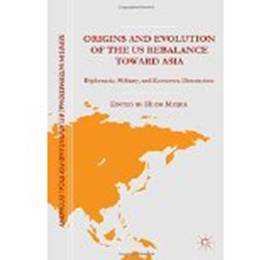 |
Abstract: This book provides a multifaceted analysis of the so-called US
'rebalance' (or 'pivot') toward the Asia Pacific. Most existing literature has focused almost exclusively
on the military dimension of the US pivot toward Asia, depicting this as a US 'grand strategy' to contain a
rising China. In contrast, this book brings to light the breadth and complexity of what is a diplomatic, military and
economic repositioning of the United States toward (and within) the Asia Pacific region. The first section of the volume
assesses the international and domestic drivers and policy objectives underlying the US rebalance toward Asia by
analyzing the multiple diplomatic, military, and economic dimensions at play, as well as their mutual linkages. The
second section examines regional reactions to this composite policy shift in Northeast Asia, Southeast Asia, Russia, and
Europe. |
| 32. The Pakistan paradox: instability and resilience/
Jaffrelot, Christophe - India: Random House, 2015 |
 |
Abstract: Pakistan was born as the creation of elite Urdu-speaking Muslims
who sought to govern a state that would maintain their dominance. After rallying non-Urdu speaking leaders around him,
Jinnah imposed a unitary definition of the new nation state that obliterated linguistic diversity. This centralisation -
'justified' by the Indian threat - fostered centrifugal forces that resulted in Bengali secessionism in 1971 and
Baloch, as well as Mohajir, separatisms today. Concentration of power in the hands of the establishment remained the
norm, and while authoritarianism peaked under military rule, democracy failed to usher in reform, and the rule of law
remained fragile at best under Zulfikar Bhutto and later Nawaz Sharif. While Jinnah and Ayub Khan regarded religion as a
cultural marker, since their time the Islamists have gradually prevailed. They benefited from the support of General Zia,
while others, including sectarian groups, cashed in on their struggle against the establishment to woo the
disenfranchised. |
| 33. Pakistan's enduring challenges / Fair, C. Christin,
Ed - Philadelphia: Penn University of Pennsylvania Press, 2015 |
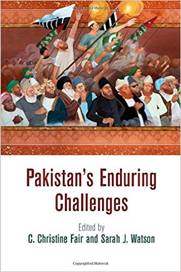 |
Abstract: From the start of the U.S. war in Afghanistan in 2001 to the
withdrawal of U.S. troops in 2014, Pakistan's military cooperation was critical to the United States. Yet Pakistani
politics remain a source of anxiety for American policymakers. Despite some progress toward democratic consolidation over
the last ten years, Pakistan's military still asserts power over the country's elected government. Pakistan's
western regions remain largely ungoverned and home to the last remnants of al-Qaeda's original leadership as well as
multiple militant groups that have declared war on the Pakistani state. The country's economy is in shambles, and
continuing tensions with India endanger efforts to bring a durable peace to a region haunted by the distant threat of
nuclear war. |
| 34. Pakistan's nuclear policy: a minimum credible
deterrence/ Khan, Zafar - London: Routledge, 2015 |
 |
Abstract: In May 1998, in reaction to India’s nuclear weapons tests,
Pakistan tested six nuclear weapons. Following this, the country opted for a policy of minimum deterrence, and within a
year Pakistan had altered its policy stance by adding the modifier of minimum ‘credible’ deterrence. This
book looks at how this seemingly innocuous shift seriously impacted on Pakistan’s nuclear policy direction and
whether the concept of minimum has lost its significance in the South Asian region’s changed/changing strategic
environment. After providing a brief historical background exploring why and how Pakistan carried out the nuclear
development program, the book questions why Pakistan could not sustain the minimum deterrence that it had conceptualized
in the immediate aftermath of the 1998 test. It examines the conceptual theoretical framework of the essentials of
minimum deterrence in order to question whether Pakistan’s nuclear policy remained consistent with this, as well as
to discover the rudimentary factors that are responsible for the inconsistencies with regard to minimum deterrence
conceived in this study. The book goes on to look at the policy options that Pakistan had after acquiring the nuclear
capability, and what the rationale was for selecting minimum deterrence. The book not only highlights Pakistan deterrent
force building, but also analyzes closely Pakistan’s doctrinal posture of first use option. Furthermore, it
examines the policy towards arms control and disarmament, and discusses whether these individual policy orientations are
consistent with the minimum deterrence. |
| 35. Peaceful intervention in intra-state conflicts: Norwegian
involvement in the Sri Lankan peace process/ Talpahewa, Chanaka - England: Ashgate, 2015 |
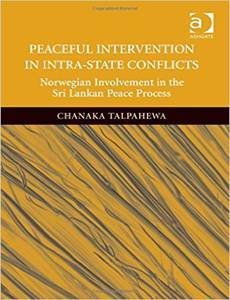 |
Abstract: Have we reached an end to the era of peaceful third party
intervention in conflict management and resolution? In the 1990s, with the ending of the Cold War, the intervention of
third parties as a non-violent means of negotiating settlements of intra-state conflicts gained prominence but the
emphasis in the twenty-first century has been increasingly on military responses. Peaceful Intervention in Intra-State
Conflicts; Norwegian Involvement in the Sri Lankan Peace Process is an in-depth, impartial discussion on the background,
decision making processes and procedures and related actions in the Norwegian facilitated peace process in Sri Lanka that
gradually shifted towards a military solution. It provides the reader with evidence based comprehensive analysis on the
attempts of peaceful third party intervention in a complex ethno-separatist intra-state conflict. |
| 36. Political economy of India's North-East border /
Datta, Sreeradha, Ed - New Delhi: Pentagon Press , 2015 |
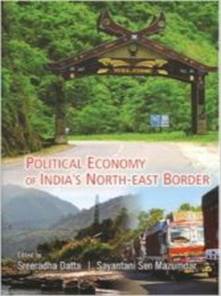 |
Abstract: "Trade across India's North-East Region (NER) is an
essential component of India's Look East Policy (LEP), an integral initiative in the reformulating of India's
foreign policy in accordance with the global reconfiguration of post-Cold War international politics. This is in tune
with India's own national interest, which mandates the economic development of the NER. The development of trade at
India's North-Eastern borders with neighbouring countries is conceived as a necessary precondition of the economic
development of the NER in particular and the country in general. In order to fully harness the potential of the NER it is
imperative to advance trade through its borders." |
| 37. Political Islam in post-revolutionary Iran: Shi'i
ideologies in Islamist discourse/ Mohammadi, Majid - New York: I.B. Tauris, 2015 |
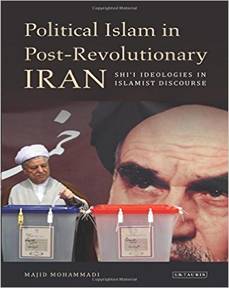 |
Abstract: The relationship between the Islamic Republic of Iran and the
Western World is fraught with challenges and tensions. In order to generate the capacity for greater engagement and
dialogue, there is a need for the West to better understand the complex ideological developments that are central to
Iran. Majid Mohammadi charts the central concepts and nuances of the ideological map of post-revolutionary Iran, and
examines the rise and development of Shi'i Islamism. He recognizes that the Islamic Republic of Iran and Iranian
political discourse are the outcome of contesting perspectives and ideologies: identity-oriented, socialist, nationalist,
authoritarian, Shari'a, scripturalist, mystical, militarist and fascist. This is a comprehensive, comparative
contribution to one of today's most important topics: that of the relationship between Political Islam and the
West. |
| 38. Politics & culture in contemporary Iran: challenging
the status quo/ Milani, Abbas, Ed - London: Lynne Rienner Publishers, 2015 |
 |
Abstract: Despite the relative calm apparent in Iran today there is
unmistakable evidence of political social and cultural ferment stirring beneath the surface. The authors of Politics and
Culture in Contemporary Iran a "a unique group of scholars activists and artistsa" explore that unrest and its
challenge to the legitimacy and stability of the present authoritarian regime. Ranging from political theory to music
from human rights law to social media their contributions reveal the tenacious and continually evolving forces that are
at work resisting the status quo. |
| 39. The Politics of subjectivity in American foreign policy
discourses / Solomon, Ty - USA: University of Michigan Press, 2015 |
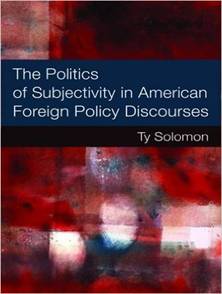 |
Abstract: Why are some discourses more politically efficacious than others
Seeking answers to this question, Ty Solomon develops a new theoretical approach to the study of affect, identity, and
discourse-core phenomena whose mutual interweaving have yet to be fully analyzed in International Relations. Drawing upon
Jacques Lacans psychoanalytic theory and Ernesto Laclaus approach to hegemonic politics, Solomon argues that prevailing
discourses offer subtle but powerfully appealing opportunities for affective investment on the part of audiences.Through
empirical case studies of the affective resonances of the war on terror and the rise and fall of neoconservative
influence in American foreign policy, Solomon offers a unique way to think about the politics of identity as the
construction of common sense powerfully underpinned by affective investments. He provides both a fuller understanding of
the emotional appeal of political rhetoric in general and, specifically, a provocative explanation of the reasons for the
reception of particular U.S. foreign policy rhetoric that shifted Americans attitudes toward neoconservative foreign
policy in the 1990s and shaped the post-911 war on terror. |
| 40. The politics of transatlantic trade negotiations: TTIP in
a globalized world/ Morin, Jean-Frederic, Ed - England: Ashgate, 2015 |
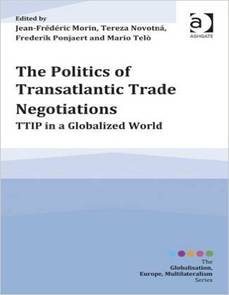 |
Abstract: By focusing on the wider process of negotiations, this novel
volume presents the first systematic analysis of the Transatlantic Trade and Investment Partnership (TTIP). The authors
include outstanding scholars and relevant practitioners from across disciplines and various academic institutions around
Europe and North America, but also from outside of the transatlantic basin. While presenting a thorough examination of
the process of TTIP negotiations, the volume is divided into four parts with each part examining a broader theme and
offering three or four shorter exploratory chapters that are accessible to academics, students, policy-makers and a wider
audience |
| 41. Public purpose in international law: rethinking
regulatory sovereignty in the global era/ Martinez-Fraga, Pedro J. - New York: Cambridge University Press,
2015 |
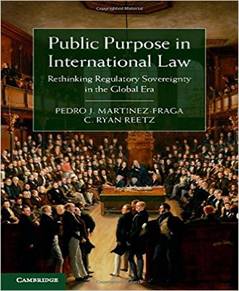 |
Abstract: This text explores how the public purpose doctrine reconciles the
often conflicting, but equally binding, obligations that states have to engage in regulatory sovereignty while honoring
host-state obligations to protect foreign investment. The work examines the multiple permutations and iterations of the
public purpose doctrine and concludes that this principle needs to be reconceptualized to meet the imperatives of
economic globalization and of a new paradigm of sovereignty that is based on the interdependence, and not independence,
of states. It contends that the historical expression of the public purpose doctrine in customary and conventional
international law is fraught with fundamental flaws that, if not corrected, will give rise to disparities in the
relationship between investors and states, asymmetries with respect to industrialized nations and developing states, and,
ultimately, process legitimacy concerns. |
| 42. R & AW: then and now/ Thakur, C.P - New Delhi: Neha
Publishers & Distributors, 2015 |
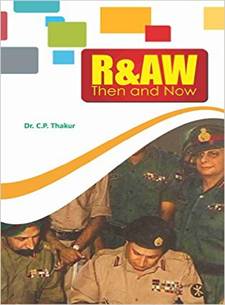 |
Abstract: The Research and Analysis Wing (R&AW or RAW) is the primary
foreign intelligence agency of India. Thus R&AW was formed in September 1968 under the guidance of its first
Director, Rameshwar Nath Kao. RAW and Pakistan's spy agency, the Inter-Services Intelligence (ISI), have been engaged
in covert operations against one other for over three decades. The ongoing dispute in Kashmir continues to fuel these
clashes, but experts say Afghanistan may be emerging as the new battleground. Islamabad sees India's growing
diplomatic initiatives in Afghanistan as a cover for RAW agents working to destabilize Pakistan. The primary function of
R&AW is gathering foreign intelligence and counter-terrorism. In addition, it is responsible for obtaining and
analysing information about foreign governments, corporations and persons to advise Indian policymakers. The internal
structure of the R&AW is a matter of speculation, but brief overviews of the same are present in the public
domain |
| 43. Rethinking international law and justice / Sampford,
Charles, Ed - England: Ashgate, 2015 |
 |
Abstract: General principles of law have made, and are likely further to
make, a significant contribution to our understanding of the constituent elements of global justice. Dealing extensively
with global headline issues of peace, security and justice, this book explores justice arising in specific areas of
international law, as well as underlying theories of justice from political science and international relations. With
contributions from leading academics and practitioners, the book adopts an interdisciplinary approach. Covering issues
such as international humanitarian law, and examining the significance of non-state actors for the development of
international law, the collection concludes with the complex question of how best to rethink aspects of international
justice.The lessons derived from this research will have wide implications for both developed and emerging nation-states
in rethinking sensitive issues of international law and justice. As such, this book will be of interest to academics and
practitioners interested in international law, environmental law, human rights, ethics, international relations and
political theory. |
| 44. Saudi Arabia in transition: insights on social,
political, economic and religious change / Haykel, Bernard, Ed - New York: Cambridge University Press, 2015 |
 |
Abstract: Making sense of Saudi Arabia is crucially important today. The
kingdom's western province contains the heart of Islam, its two holiest mosques in Mecca and Medina, and it is the
United States' closest Arab ally and the largest producer of oil in the world. However, the country is undergoing
rapid change: its aged leadership is ceding power to a new generation, and its society, which is dominated by young
people, is restive. Saudi Arabia has long remained closed to foreign scholars, with a select few academics allowed into
the kingdom over the past decade. This book presents the fruits of their research as well as those of the most prominent
Saudi academics in the field. The fifteen chapters in this volume focus on different sectors of Saudi society and examine
how the changes of the past few decades have affected each. Many of the authors have conducted archival and fieldwork
research in Saudi Arabia, benefitting from the recent opening of the country to foreign researchers. |
| 45. The silence of the many: the fallout of operation blue
star/ Eapen, George P. - New Delhi: Viva Books, 2015 |
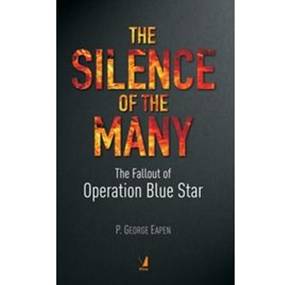 |
Abstract: Even into seven decades of political independence the Indian
nation strives to achieve social freedom for its masses. Among the various kinds of social malaise the most debilitating
is the occurrence of periodic communal violence. In the Indian context the fault lines straddle religious, caste, ethnic,
linguistic or economic class contours. This book is a testimony to the depravity of 1984 in the country extending too
many years thereafter, following army action at the Golden Temple complex. The author strives to present a balanced and
objective narrative of events at the national level interspersed with his own experiences. He is convinced that
apportioning total blame on a community, group or party for the ignominious events will be as subversion of truth. It is
often the insidious few who act with diabolical intent in shedding blood. He exhorts the majority not to remain silent
when faced with a crisis beyond their boundaries. The book is a testament of faith that the nation one day will emerge as
a place where peace, justice and harmony prevail. |
| 46. Successful strategies: triumphing war and peace from
antiquity to the present/ Murray, Williamson, Ed - New Delhi: Cambridge University Press, 2015 |
 |
Abstract: Successful Strategies is a fascinating new study of the key
factors that have contributed to the development and execution of successful strategies throughout history. With a team
of leading historians, Williamson Murray and Richard Hart Sinnreich examine how, and to what effect states, individuals
and military organizations have found a solution to complex and seemingly insoluble strategic problems to reach success.
Bringing together grand, political and military strategy, the book features thirteen essays which each explores a unique
case or aspect of strategy. The focus ranges from individuals such as Themistocles, Bismarck and Roosevelt to
organizations and bureaucratic responses. Whether discussing grand strategy in peacetime or that of war or politics,
these case studies are unified by their common goal of identifying in each case the key factors that contributed to
success as well as providing insights essential to any understanding of the strategic challenges of the future. |
| 47. Super Economics: America, India, China & the future
of the world/ Bahl, Raghav - London: Penguin Books , 2015 |
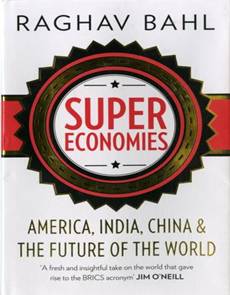 |
Abstract: Our times are characterized not by estranged Superpowers building
formidable arsenals but by engaged societies building a robust global economy. Emerging countries are redefining the
geo-economic (and geopolitical) dynamic; in the new world order, a soaring GDP and a booming population are the true
indicators of a nation's strength. The twenty-first century will be led, Raghav Bahl says, by a handful of Super
Economies-large, prosperous countries with a high growth rate, ranking among the world's top trading partners,
commanding 15 to 20 per cent of global GDP, having nuclear arms but using economic leadership to effect significant
change. The USA and China qualify automatically as the two existing Super Economies. // With its demographic advantage, a
surplus of skilled labour, a GDP that is expected to jump from $2 trillion to over $5 trillion by 2025, a strategic
geographic location and a new, decisive political leadership, India has every chance, Bahl argues, of becoming the third
Super Economy. As the world's largest democracy, its arrival will enhance global stability and ensure that the
balance of power remains free, fair and representative of the people. Drawing on history, current affairs and political
and economic analyses, Super Economies projects how India can soon become a world leader and help secure a future of
peace and prosperity for all. |
| 48. Tajikistan in the 21st century: society politics and
economy/ Warikoo, K. Ed - New Delhi: Pentagon Press, 2015 |
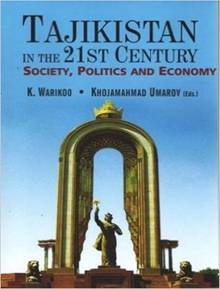 |
Abstract: Tajikistan is a mountainous landlocked country in Central Asia
with Afghanistan bordering to its South, Uzbekistan to the west, Kyrgyzstan to the North and China to the east.
Tajikistan also lies adjacent to Pakistan and the Gilgit-Baltistan region, separated by the narrow Wakhan Corridor. Due
to its common borders with Afghanistan, Tajikistan has become a strategic frontline in the region being directly affected
by the spillover effects of cross-border terrorism, religious extremism and drug trafficking. |
| 49. Terrorism and political violence / Kennedy-Pipe,
Caroline, Ed - London: Sage, 2015 |
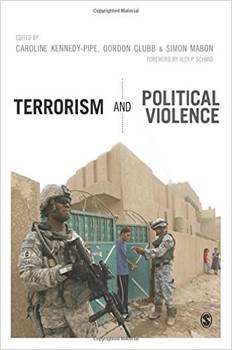 |
Abstract: This book introduces you to the key issues in contemporary studies
on Terrorism. Its interdisciplinary approach provides a unique intellectual rigour which introduces readers to cutting-
edge research. Bringing together chapters contributed by members of the Terrorism and Political Violence Association
network, it offers an insight into a variety of traditional and critical perspectives. It also equips Undergraduate and
Postgraduate students with the study skills needed to succeed in coursework and assignments, especially dissertation
work. |
| 50. Terrorism in cyberspace: the next generation/ Weimann,
Gabriel - New York: Columbia University Press, 2015 |
 |
Abstract: The war on terrorism has not been won, Gabriel Weimann argues in
Terrorism in Cyberspace, successor to his seminal 2006 book, Terror on the Internet. Even though al-Qaeda’s
leadership has largely been destroyed and its organization disrupted, terrorist attacks take 12,000 lives annually
worldwide and jihadist terrorist ideology continues to spread. How? Largely by going online and adopting a new method of
organization. Terrorist structures, traditionally built of loose-knit cells, divisions, and subgroups, are ideally suited
for flourishing on the Internet through websites, email, chat rooms, e-groups, forums, virtual message boards, YouTube,
Google Earth, and other outlets. Weimann addresses terrorism’s arrival online; recent trends-such as engaging
children and women, promoting lone wolf attacks, and using social media-and future threats, along with ways to counter
them. He analyzes content from more than 9,800 terrorist websites and selects their most important kinds of web activity,
describes their background and history, and surveys their content in terms of kind and intensity, the groups and
prominent individuals involved, and their effects. |
| 51. Theorizing foreign policy in a globalized world /
Hellmann, Gunther, Ed - New York: Palgrave Macmillan, 2015 |
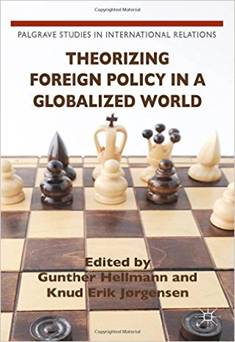 |
Abstract: In an increasingly globalized world, the classic image of foreign
policy as a political practice conducted by sovereign states has become increasingly inadequate. However, rather than
tackling the transformation of foreign policy as a process of both scholarly and immediate political interest, foreign
policy analysis and International Relations theory have become separate fields of study over the past decades, co-
existing in a state of mutual and more or less benign neglect. In Theorizing Foreign Policy in a Globalized World,
prominent authors address this issue, offering solutions to the analytical deadlock that are both provocative and
innovative. |
| 52. Transboundary water politics in the developing world /
Mirumachi, Naho - London: Routledge, 2015 |
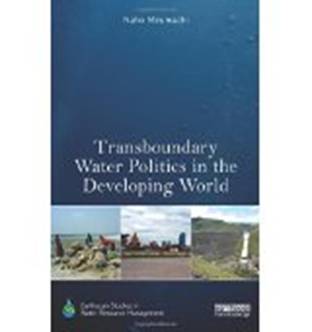 |
Abstract: This book examines the political economy that governs the
management of international transboundary river basins in the developing world. These shared rivers are the setting for
irrigation, hydropower and flood management projects as well as water transfer schemes. Often, these projects attempt to
engineer the river basin with deep political, socio-economic and environmental implications. The politics of
transboundary river basin management sheds light on the challenges concerning sustainable development, water allocation
and utilization between sovereign states. Advancing conceptual thinking beyond simplistic analyses of river basins in
conflict or cooperation, the author proposes a new analytical framework. The transboundary Waters Interaction NexuS
(TWINS) examines the coexistence of conflict and cooperation in riparian interaction. This framework highlights the
importance of power relations between basin states that determine negotiation processes and institutions of water
resources management. The analysis illustrates the way river basin management is framed by powerful elite decision-
makers, combined with geopolitical factors and geographical imaginations. In addition, the book explains how national
development strategies and water resources demands have a significant role in shaping the intensities of conflict and
cooperation at the international level. |
| 53. The UNECE convention on the protection and use of
transboundary watercourses and international lakes: its contribution to international water cooperation / Tanzi, Attila,
Ed - Leiden: Brill Nijhoff, 2015 |
 |
Abstract: The UNECE Convention on the Protection and Use of transboundary
Watercourses and International Lakes provides invaluable insights into the contribution of this international agreement
towards transboundary water cooperation via its legal provisions, accompanying institutional arrangements and subsidiary
policy mechanisms. Contributing authors - experts on key aspects of the Convention - address a broad range of issues,
primarily concerning its: development and evolution; relationship with other multi-lateral agreements; regulatory
framework and general principles; tools for arresting transboundary pollution; procedural rules; compliance and liability
provisions; and select issues including its Protocol on Water and Health. |
| 54. United States-China-India strategic triangle in the India
ocean region / Fernando, Sithara, Ed - New Delhi: KW Publishers, 2015 |
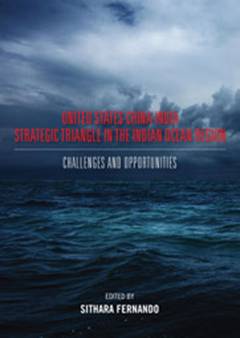 |
Abstract: While the strategic dynamics in the IOR are complex and involve
many powers there is little doubt that the "strategic triangle" involving the US, China and India is one of the
key traditional security issues facing the IOR. Given Sri Lanka's geopolitically significant location in the IOR this
strategic triangle is bound to have an impact on its national interests and security. The central questions raised by
this volume are the following: 1) What are the prospects of competition and cooperation within the strategic triangle? 2)
What structure or pattern will the triangular relations assume? 3) How can stability be maintained in the triangular
relationship in the interest of peace in the IOR? 4) What would be the impact of this strategic triangle on a small
country such as Sri Lanka situated in a geopolitically significant location in the IOR? The dynamics of the US-China-
India strategic triangle in the IOR will be complicated, containing elements of both competition and cooperation. The
research contained in the substantive chapters of this volume present a multiplicity of views on the possible patterns
that the strategic triangle can assume. |
| 55. US missile defense strategy: engaging the debate/ Mayer,
Michael - London: First forum Press, 2015 |
 |
Abstract: Why has the United States continued to develop ballistic missile
defenses in an era of irregular warfare and asymmetric terrorist threats? How does missile defense contribute to US
global strategy? Can the BMD system achieve the goals that lay behind its creation? Michael Mayer addresses these
questions in his balanced approach to the contentious debate over the strategic value of missile defense. Mayer surveys
the grand strategies of the Clinton, Bush, and Obama administrations, methodically comparing them with each president s
missile defense policies. He also demystifies the fundamentals of the BMD system. Seeking to change the terms of the
debate, he cogently challenges much of the conventional wisdom touted by both supporters and detractors of ballistic
missile defense. |
| 56. Wars from within: understanding and managing insurgent
movements/ Schnabel, Albrecht, Ed - London: Imperial College Press, 2015 |
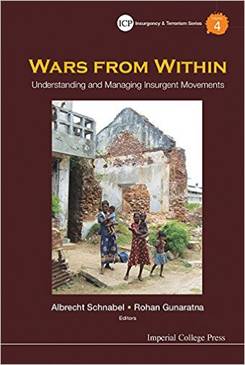 |
Abstract: Wars from Within brings together an international and
multidisciplinary group of academics and practitioner-researchers specializing in the study of insurgent movements in
order to provide a deeper understanding of the violent manifestations of insurgencies in different parts of the world. In
doing so, the book adopts both a functional and regional approach. Firstly, thematic chapters discuss the typology of
insurgencies (ethnopolitical, religious and ideological), past and potential responses to them, as well as the impact of
advance communication technology on insurgent activity. The book then presents a series of case studies assessing the
successes and failures of managing contemporary insurgencies. These are drawn from European, Asian and Middle Eastern
insurgencies, as well as the global al-Qaeda network that typifies the post-9/11 challenge posed by internationally
operating terrorist organizations. The case studies highlight factors and conditions that trigger, escalate, de-escalate
and ultimately end insurgent campaigns. The book concludes with an assessment of how the international community at large
has responded and should respond to insurgencies in the future. |
| 57. The Washington connection and third world fascism/
Chomsky, Noam - London: Pluto Press, 2015 |
 |
Abstract: The Political Economy of Human Rights is an important two volume
work, co-authored with Edward Herman – also co-author of the classic Manufacturing Consent – which provides a
complete dissection of American foreign policy during the 1960s and '70s, looking at the entire sweep of the Cold War
during that period, including events in Vietnam, Cambodia, Indonesia and Latin America. For those looking to develop a
broad understanding of American foreign policy during the 20th Century this work has been a vital resource and is now
available to a new generation of scholars and activists. For too long now, many important books by Noam Chomsky have been
left to languish. Introducing Pluto’s 'Chomsky Perspectives' series: a collectible, beautiful new list,
with cover design by David Pearson. Including both enduring favourites and neglected essentials, these books will appeal
to the serious Chomsky reader. |
| 58. Which European union?: Europe after the Euro crisis/
Fabbrini, Sergio - New York: Cambridge University Press, 2015 |
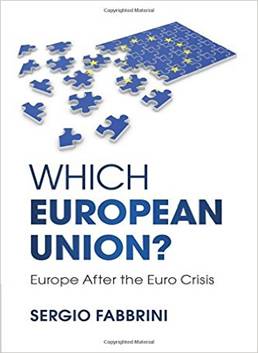 |
Abstract: Sergio Fabbrini argues that the European Union (EU) is made up of
states pursuing different aims, rather than simply moving in the same direction at different speeds. He describes the
alternative perspectives on the EU (an economic community, an intergovernmental union, and a parliamentary union), that
led to multiple compromises in its structure and shows how the Euro crisis has called them into question. The book argues
that a new European political order is necessary to deal with the consequences of the crisis, based on an institutional
differentiation between the EU member states interested only in market co-operation and those advancing towards a genuine
economic and monetary union. Such a differentiation would allow the latter group to become a political union,
conceptualised as a compound union of states and citizens, while preserving a revised framework of a single market in
which both groups of states can participate. |
|